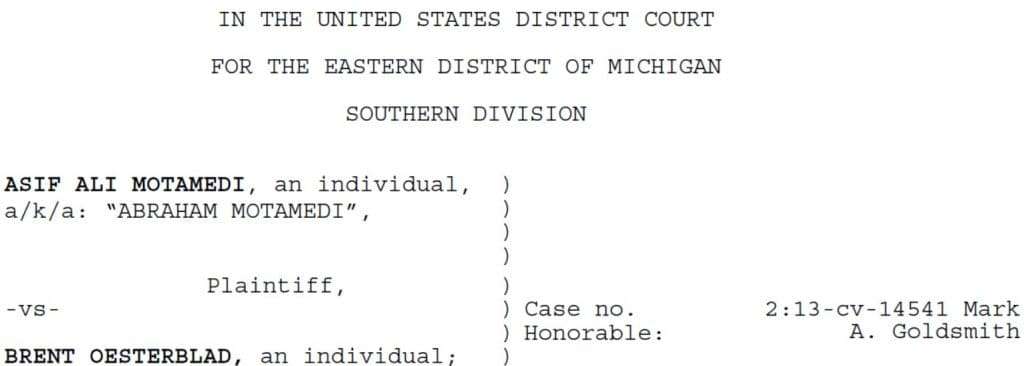The Volokh Conspiracy
Mostly law professors | Sometimes contrarian | Often libertarian | Always independent
Another libel takedown order

Check out this order, Motamedi v. Oesterblad (E.D. Mich. Aug. 5, 2015), submitted to Google with a request to deindex the websites listed as defamatory in the order; here's an excerpt:
DEFAULT JUDGMENT AND PERMANENT INJUNCTION
Recitals
WHEREAS, Plaintiff, through counsel, having filed a motion entitled: PLAINTIFF'S MOTION FOR: ENTRY OF DEFAULT AGAINST DEFENDANT WEBEXPRESS, LLC AND DEFAULT JUDGMENT AGAINST DEFENDANTS, which appears as docket number 18 on the CM/ECF system in this case.
WHEREAS, Plaintiff's motion having been scheduled and brought on for hearing before the Court and submitted to the Court for decision on Thursday, July 31, 2015, before the honorable Judge Mark A. Goldsmith, presiding….
IT IS HEREBY ORDERED: that Plaintiff is awarded a money judgment in the amount of $5,270.19 for Plaintiff and against Defendants ….
IT IS FURTHER ORDERED: that to prevent further or future harm to Plaintiff's reputation in the community and protect his employment from the dangers of labeling him as a "sex offender", Plaintiff is awarded a permanent injunction against Defendants … compelling these Defendants to immediately remove any and all sex offender postings of Plaintiff caused by these Defendants, including but not limited to the sex offender postings presently on the following websites:
- http://www.sexoffenderrecord.com/citydirectory/ID/Meridian/Abraham_Motamedi_1353346
- http://www.sexcrimedata.com/
- http://ev.onlinedetective.com/
- http://onlinedetective.com/
- http://offendex.com/IT IS FURTHER ORDERED: that to prevent further or future harm to Plaintiff's reputation in the community and protect his employment from the dangers of labeling him as a "sex offender", Plaintiff is awarded a permanent injunction against Defendants … compelling these Defendants to refrain from ever posting any similar sex offender posting concerning Plaintiff or otherwise posting defamatory statements concerning Plaintiff on the internet.
IT IS SO ORDERED.
This Order is a final judgment and therefore resolves the last pending claim and closes the case.
Dated: August 5, 2015 s/Mark A. Goldsmith
… MARK A. GOLDSMITH
United States District Judge …
This might raise all sorts of interesting questions: Should 47 U.S.C. § 230 allow injunctions ordering websites to remove material that had been found to be defamatory? Should the injunctions be binding on Google and similar sites, even if they weren't named as defendants (a question pending before the California Supreme Court, in Hassell v. Bird)? If they aren't (and this order indeed doesn't claim to bind Google), should Google voluntarily deindex sites found to be defamatory? Should Google be suspicious of default judgments, because of the possibility that the defendant wasn't properly served?
Alas, this is not the case to deal with these interesting questions - because it's not a case. There is no Motamedi v. Oesterblad in the Eastern District of Michigan. The case number 2:13-cv-14541 (the number listed in the order) in that district corresponds to a completely different order. There is no Daniel Ro. Markus, the lawyer who, according to the order, was responsible for the case. The order submitted to Google was a forgery, like the ones discussed here (Lichterman and Aukerman), here (Arnstein), and here (Haas).
There is a Motamedi - indeed, such a forged order is useful only insofar as the URLs that it aims to get deindexed are real URLs that criticize real people. I got in touch with him, to see whether he was responsible for filing the order, or if this was done by some company he hired (in which case it might have been done without his knowledge that the order would be forged). I got a good deal of bluster from him and insistence that this was indeed a real order. Maybe he does believe that it is a real order, because he hired someone who duped him into thinking that a real order was procured - but he wouldn't tell me who that someone might be.
And this should be instructive to all of us: Never trust a court document (a subpoena, an order, or anything else) from someone else's case until you check it with the court records. Sometimes you can do it online for free, sometimes for a modest amount - and if you get the document as part of your business, it's a cost of doing business - and sometimes by calling the clerk of court's office. I wish that this weren't so, and that you could trust documents that ostensibly come from the government. But you can't.
For more on other Internet libel takedown orders and related matters - some of which are fraudulent or at least underhanded in other ways - see this set of posts.


Show Comments (0)